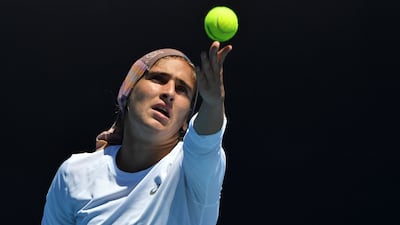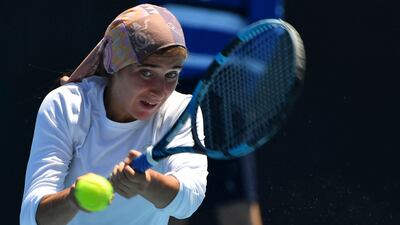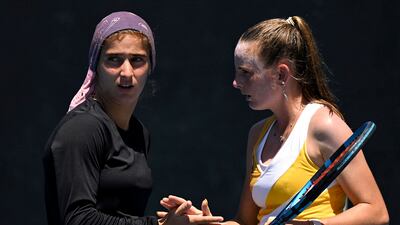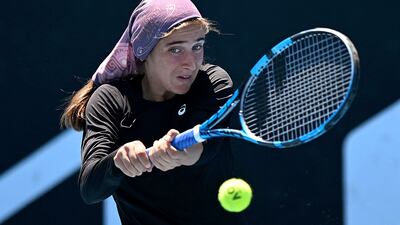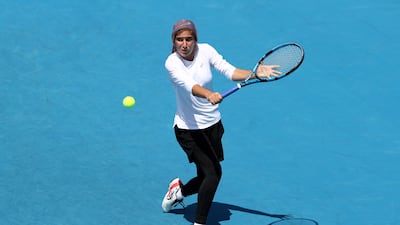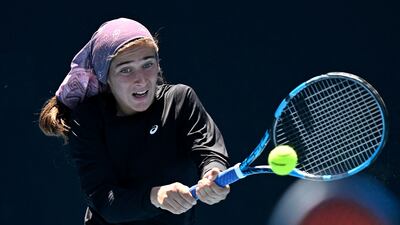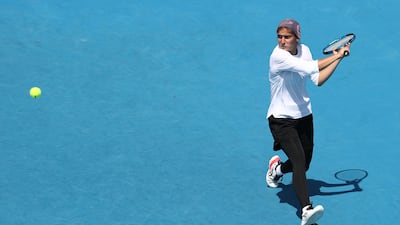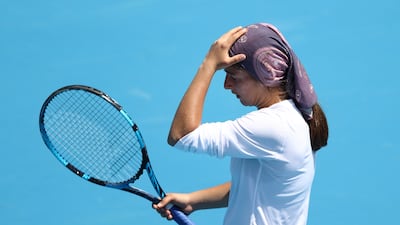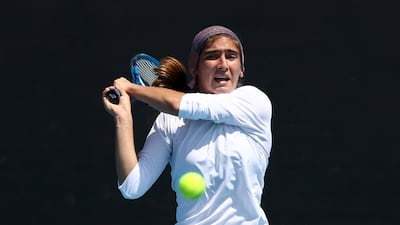A day after making history by becoming the first ever player from Iran to win a Grand Slam junior match, Meshkatolzahra Safi came face to face with the man who inspired her to take up tennis in the first place: Rafael Nadal.
In the hallways of the Australian Open, Safi got to meet her idol and posted a photo with him on her Instagram to commemorate the special moment.
It was undoubtedly an experience the 17-year-old will cherish forever, but it wasn’t just meaningful for her. Nadal finds Safi’s story “amazing” and was thrilled he got to meet her.
“I was in the corridor and somebody from the tournament just introduced me to her and explained to me a little bit the history. For me it was a pleasure to know more about her, I think it’s amazing, her story; super special to see players from different parts of the world, especially parts of the world that historically we never had players on the tour,” Nadal told The National in a voice message on Tuesday, after he booked himself a spot in the Australian Open semi-finals.
“I think it’s fantastic to see a player from Iran that now is in the juniors and she already won a match. It’s a great story and it really was a pleasure to meet her.
“One of the most beautiful things is that sport can change life of people and every time our sport is arriving to more places, it’s being more global and stories like hers say that we’re on the right way to keep promoting our sport in every single part of the world.”
Nadal, who is gunning for an all-time record 21st Grand Slam title this fortnight in Melbourne, has inspired countless people across the globe but still finds it humbling to hear that Safi played tennis for the first time because she watched him play a match on TV.
“For me, it’s something special. If I am able to inspire anyone to help them to make positive decisions on the lives of the people, it’s something that I am very proud of,” said the Spaniard.
“In this particular case, if that helped her to try to play tennis and now she is where she is, it’s a big honour for me and I’m super happy for that.”
It has been a special tournament for the juniors this week at Melbourne Park with Safi not the only player making headlines.
On Tuesday, Angella Okotuyi became the first Kenyan woman to reach the third round in singles of any event at a Grand Slam.
World No1 Ashleigh Barty has followed both teenagers this week and noted how Tunisian top-10 star Ons Jabeur, as a Muslim, an Arab, and an African, has likely played a big part in inspiring youth in the Middle East and Africa.
“The growth in the women's game is exceptional,” said Barty after defeating Jessica Pegula to reach the last four at the Australian Open.
“The depth in our women's game now on the professional side, there have been so many players that have inspired others to pick up a racquet or to dare to dream.
“One of the ones that comes to mind straightaway is Ons, the way she's been able to inspire a nation. I have known Ons for a very long time, and she was a lone wolf for a long time in her trade. Now there are more people, more players on the men's and women's side or the girls and boys coming through, understanding it's okay to dare to dream and to chase after it and have a go."
Barty acknowledges it will take time to get big numbers breaking through from countries that are just getting started in tennis, but believes the foundation is being built right now and it’s inevitable that more talent will emerge.
“I know that a lot of the players that are playing now are really proud to represent that and be a part of that, because it is a really cool change and a cool way to integrate the game into so many different countries all around the world,” she added.
One player who is all too familiar with the concept of being a trailblazer is India’s Sania Mirza. The 35-year-old, who is retiring at the end of this season, has rewritten the history books for Indian tennis over and over again throughout her career.
A former top-30 player in singles, and an ex-world No.1 in doubles, the multiple-time Grand Slam doubles champion had to go through a lot as a young Muslim tennis player representing the subcontinent.
Asked what she thinks a teenager like Safi should do to block all the noise that will come her way if she continues to rise through the ranks, Mirza said: “Honestly I think that it was a lot easier to ignore the noise 20 years ago; it’s a lot harder to do it now.
“There’s so much social media and every time you pick up your phone you’re hearing things and you see many times.”
She added: “I think that it is incredible – I know there’s not a lot of tennis in Kenya but I think it’s even more incredible that an Iranian girl has won a round at a Grand Slam. I think that is very special for more reasons than one. I don’t want to get into the reasons, but I think it is extremely special and I just hope that she gets that chance to build from here.
“I actually just saw her picture with Rafael Nadal and it fills your heart honestly. Because I think that when you are, as I have been, the first person to do many things from my country or from the subcontinent, it is very special to be able to do this.”
Mirza also paid credit to Jabeur for the impact she is having on the Mena region.
“She’s inspiring people. Many times we talk to each other and we connect on that level, she’s a great friend and we’re able to connect and I think this is just a proof of what she’s able to do and inspire young girls from that part of the world,” Mirza said of Jabeur.
Safi lost her girls singles second round on Tuesday but will walk away from this Australian Open with memories that will last a lifetime, and a jolt of motivation that will spur her forward.
